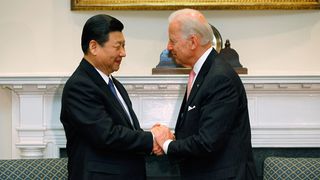Joe Biden won more of the popular vote than any previous presidential candidate. An adult will return to the Oval Office.
But the grievances that propelled Trump to power, the forces that almost delivered him a second term, will still scorch America’s political landscape, poisoning its wellsprings. Biden now looks into this abyss. If he cannot win the Senate, it will stymie and stall him.
What it means for US foreign policy is less clear. Polls consistently show Americans support global engagement. It is hard to abandon providential visions of manifest destiny, to relinquish the idea of America as the shining city on a hill. But Biden will prioritise arresting the pandemic and trying, however awesome the task, to heal a riven society. Foreign policy tones towards allies and multilateralism will be warmer, but there will be no recrudescence of the America of old.
Biden will prioritise arresting the pandemic and trying, however awesome the task, to heal a riven society. Foreign policy tones towards allies and multilateralism will be warmer, but there will be no recrudescence of the America of old.
Writing in 1943, and faced with a different kind of challenge – of America finding an accepted and settled foreign policy – the great American journalist Walter Lippmann wrote that "the spectacle of this great nation which does not know its own mind is as humiliating as it is dangerous. It casts doubt upon the capacity of the people to govern themselves’.
Lippmann worried that the failure to find a consensus would corrode American self-confidence and self-respect. "Rent by domestic controversy," he mused, "for want of a settled foreign policy, we shall act not upon reflection and choice but under the impulse of accidents and the impact of force."
What Lippmann himself named the "Cold War" provided that consensus. But Trump’s rise threw doubt on that very enterprise. He believed the Cold War ultimately became a charity project, and that America sacrificed too much in the cause of these high ideals when that conflict ended. Accepting that this verdict found favour in much of the American heartland is fundamental to understanding what Trumpism means and why it will continue to resonate.
During Trump’s term, Australian leaders preferred to look away from America’s convulsion. Instead, they hosted lavish dinners on floating museums in New York and hoped America would recover the leadership that shaped their childhoods. These approaches had some advantages – staving off Trumpian wrath, reassuring an anxious Australian public amid China’s aggressive turn under President Xi Jinping.
But they have also meant a studied refusal to come to terms with the consequences of these forces for American leadership, especially in Asia.
Wishful thinking on China
No ally in Asia worth their salt will believe that this election changes the fundamentals. American resolve to retain regional pre-eminence remains. But serious questions still hang over its capability to do so. Biden’s advisers have already crafted frameworks and formulas to reassert America’s regional position. But they assume China will accept such terms with no quibbles. And it’s not clear what role Australia plays, beyond being the tethered goat that continues to cop economic beatings from Beijing.
Biden’s advisers have already crafted frameworks and formulas to reassert America’s regional position. But they assume China will accept such terms with no quibbles.
Last year, audiences here heard US academic John Mearsheimer proclaim that just as the US had overcome German militarism, Hitler’s fascism, Japanese militarism and Soviet communism, so it would ultimately vanquish communist China. It carried more than a whiff of wishful thinking then. It still does, because it’s not clear Americans want – or would win – that kind of struggle.
The last time Australia lost a great ally was a very different experience. There were formal announcements from London: in 1961, that Britain would seek European Economic Community membership; in 1965, that British troops would eventually withdraw from south-east Asia. Decolonisation dropped Union Jacks from flagpoles.
Australian governments, even as they went all the way with LBJ in Vietnam, appealed to London not to turn away from Asia; claimed that only Britain could help Canberra and Washington play the kind of stabilising role needed to keep Asia’s communist "hordes" at bay. Newspapers talked of Britain’s retreat as a "Far East Death Warrant" for Australia. But America’s presence cushioned the blow.
Short of a devastating crisis, the US will not retreat from Asia along those lines. But America’s allies in Asia have already been getting on with the job over the past four years. They will continue to do so.
Canberra will wisely refrain from delivering homilies to America on its weakening grip on global and regional hegemony. But it should try to find a middle ground where its current policy – of looking to alternative partners in dealing with a rising China – is also more realistic about the present and future passage of American prestige and power.
Recall, however, that obituaries for American democracy aren’t new. Richard Nixon once spoke of his nocturnal strolls around Washington, the illuminated memorials on the Mall reminding him of "what happened to Greece and Rome". All that remained of those societies, he said, were "the pillars".
The lesson he divined was that "great civilisations of the past, as they have become wealthy, as they have lost their will … to improve … become subject to the decadence which eventually destroys a civilisation". Nixon, of course, added his own sorry tale of presidential vice to a country then tearing itself apart.
Nixon felt the American century was nearing its end, in 1971. It wasn’t. But in succeeding decades, the racial, cultural and socio-economic cleavages only widened. It is difficult to see what now brings the country together in the way Pearl Harbour, Sputnik and the September 11, 2001 terrorist attacks did. No obvious catalyst for national unity looms. This is the America Biden inherits. His speeches over the past few days, however, are a good place to start.






